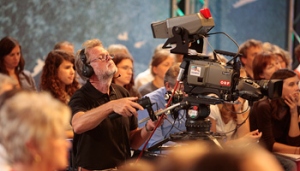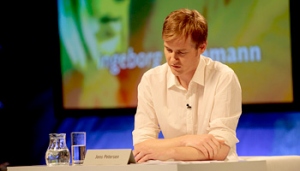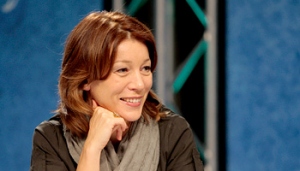 Jens Petersen (Bild: ORF)
Jens Petersen (Bild: ORF)
Petersen’s text – kitsch or art?
In his novel excerpt “Bis dass der Tod” (Until death) Jens Petersen tells the story of a desperate love in the underclass, which ends in an act of euthanasia. And so the jury asks, “kitsch or art”.
Petersen, who incidentally is a consultant neurologist by profession, was invited by Burkhard Spinnen.
Triggers strange “prairie romanticism”
“A very oppressive text that triggers claustrophobia in me”, is Meike Feßmann’s initial observation – an element that is acceptable about the story for her. The jury did not like the use of the present tense, however: “You don’t need to screw the screw even tighter.” The juror is confused about the fact that the text, with is colportage elements and “prefabricated parts”, triggered a “strange kinds of prairie romanticism” in her. “I feel ambiguous, it doesn’t fit.”
 Kameramann Anton Wieser (Bild: ORF/Johannes Puch)
Kameramann Anton Wieser (Bild: ORF/Johannes Puch)
A “list of ingredients for death”
“I think I can help you along there”, said Paul Jandl in response. The images – the old VW van, the bankrupt pharmaceutical company, the derelict mill, the dried-out brook bed – are “traces of a full list of ingredients for death”. “Much more would not have been possible, that is also my problem with the text”, says Jandl.
 Paul Jandl (Bild: ORF/Johannes Puch)
Paul Jandl (Bild: ORF/Johannes Puch)
Sulzer: “I am completely thrilled”
Alain Claude Sulzer noted that the present tense creates presence: “I read the book on instinct and I believe every word of it. It is about death – the author brings that across in a clear and precise way, I am completely thrilled!”
“There are grave dangers associated with this topic”, Karin Fleischanderl began her criticism – only to then note that the text manages to safely navigate between “Scylla” and “Charybdis”. “Graphically and sensually very well done”, was her overall judgement.
“A wild and romantic story”
“I did not fully understand the text”, said Ijoma Mangold, who nonetheless liked it, and he added: “But that doesn’t matter.”
A purely psychological-realist interpretation would not be enough. Although he is not quite able to categorise the “post-apocalyptic periphery” in which the text is set, he is nonetheless impressed. “A wild and romantic story that toys with the death-of-love motif.”
Burkhard Spinnen then said: “My blood runs cold every time I hear this very precisely crafted story. I can’t wait to find out how this character goes on in the novel!”
 Jens Petersen (Bild: ORF/Johannes Puch)
Jens Petersen (Bild: ORF/Johannes Puch)
Keller: “There is something unpleasant about the text”
Paul Jandl thought the motifs in the text were “somewhat artificial”. Looked at with an evil eye, this “post-civilisation landscape” could also be described as “kitsch” – these ambivalent interpretations are contained within the text itself. “I have not quite fought out this battle for myself.”
Hildegard Elisabeth Keller joined the ambivalent criticism levelled by Jandl and said: “There is something unpleasant about the text, it is bleak through and through – created very skilfully, but a text entirely without light. And: where are the protagonist’s feelings? And what illness does this woman even have?”
 Clarissa Stadler (Bild: ORF/Johannes Puch)
Clarissa Stadler (Bild: ORF/Johannes Puch)
Stadler: “Not everything needs to be labelled!”
Here, presenter Clasissa Stadler intervened and said: “In a state of emergency, not everything needs to be labelled!” Reply from one of the jury members: “We are talking about literature here!”
Barbara Johanna Frank
translated by expectTranslations